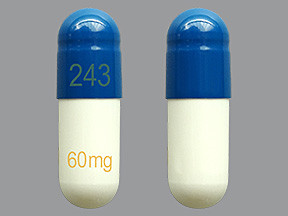DULOXETINE - ORAL
PHONETIC PRONUNCIATION: (doo-LOX-e-teen)
COMMON BRAND NAME(S): Cymbalta
GENERIC NAME(S): duloxetine HCl
Uses
USES: Duloxetine is used to treat depression and anxiety. In addition, duloxetine is used to help relieve nerve pain (peripheral neuropathy) in people with diabetes or ongoing pain due to medical conditions such as arthritis, chronic back pain, or fibromyalgia (a condition that causes widespread pain). Duloxetine may improve your mood, sleep, appetite, and energy level, and decrease nervousness. It can also decrease pain due to certain medical conditions. Duloxetine is known as a serotonin-norepinephrine reuptake inhibitor (SNRI). This medication works by helping to restore the balance of certain natural substances (serotonin and norepinephrine) in the brain.
How to use DULOXETINE - ORAL
HOW TO USE: Read the Medication Guide and, if available, the Patient Information Leaflet provided by your pharmacist before you start using duloxetine and each time you get a refill. If you have any questions, ask your doctor or pharmacist. Take this medication by mouth as directed by your doctor, usually 1 or 2 times a day with or without food. If you have nausea, it may help to take this drug with food. Swallow the capsule whole. Do not crush or chew the capsule or mix the contents with food or liquid. Doing so can release all of the drug at once, increasing the risk of side effects. The dosage is based on your age, medical condition and response to treatment. To reduce your risk of side effects, your doctor may direct you to start this medication at a low dose and gradually increase your dose. Follow your doctor's instructions carefully. Take this medication regularly to get the most benefit from it. To help you remember, take it at the same time(s) each day. It is important to continue taking this medication as prescribed even if you feel well. Do not stop taking this medication without consulting your doctor. Some conditions may become worse when this drug is suddenly stopped. Also, you may experience symptoms such as dizziness, confusion, mood swings, headache, tiredness, diarrhea, sleep changes, and brief feelings similar to electric shock. Your dose may need to be gradually decreased to reduce side effects. Report any new or worsening symptoms right away. Tell your doctor if your condition persists or worsens.
Side Effects
Precautions
Interactions
Overdose
Images

- color
- dark blue
- shape
- oblong
- imprint
- LU, Q02

- color
- dark blue
- shape
- oblong
- imprint
- LU, Q02
Reviews
Faq for DULOXETINE - ORAL
Duloxetine oral is primarily used to treat depression, anxiety disorders, fibromyalgia, and chronic pain conditions such as nerve damage or arthritis.
Duloxetine oral belongs to a class of medications called selective serotonin and norepinephrine reuptake inhibitors (SNRIs). It works by increasing the levels of serotonin and norepinephrine in the brain, which helps improve mood, reduce anxiety, and relieve pain.
Common side effects of duloxetine oral include nausea, dry mouth, constipation, fatigue, dizziness, drowsiness, and increased sweating. It is important to inform your doctor if these side effects persist or worsen.
The effects of duloxetine oral may not be felt immediately. It may take several weeks for the medication to start working effectively. It is important to continue taking the medication as prescribed and consult with your doctor if you do not notice any improvement.
Yes, duloxetine oral may increase the risk of suicidal thoughts or behavior in children, adolescents, and young adults. It is important to closely monitor individuals taking this medication, especially during the first few months of treatment. Other precautions include avoiding alcohol consumption and discussing any existing medical conditions or medications with your healthcare provider.
The use of duloxetine oral during pregnancy or while breastfeeding should be discussed with a healthcare professional. It is generally not recommended, as it may have potential risks to the fetus or infant. Your doctor will weigh the benefits and risks before prescribing this medication.
Certain medications may interact with duloxetine oral, including other antidepressants, blood thinners, pain medications, and certain herbal supplements. It is important to inform your doctor about all the medications you are currently taking to avoid any potential interactions.
If you miss a dose of duloxetine oral, take it as soon as you remember. However, if it is close to the time for your next dose, skip the missed dose and continue with your regular dosing schedule. Do not double the dose to make up for the missed one.
No, duloxetine oral should not be abruptly stopped without consulting a healthcare professional. Gradually reducing the dosage is recommended to avoid withdrawal symptoms such as nausea, headache, dizziness, and irritability.
Warning
WARNING: Antidepressant medications are used to treat a variety of conditions, including depression and other mental/mood disorders. These medications can help prevent suicidal thoughts/attempts and provide other important benefits. However, a small number of people (especially people younger than 25) who take antidepressants for any condition may experience worsening depression, other mental/mood symptoms, or suicidal thoughts/attempts. Therefore, it is very important to talk with the doctor about the risks and benefits of antidepressant medication (especially for people younger than 25), even if treatment is not for a mental/mood condition. Tell the doctor right away if you notice worsening depression/other psychiatric conditions, unusual behavior changes (including possible suicidal thoughts/attempts), or other mental/mood changes (including new/worsening anxiety, panic attacks, trouble sleeping, irritability, hostile/angry feelings, impulsive actions, severe restlessness, very rapid speech). Be especially watchful for these symptoms when a new antidepressant is started or when the dose is changed.
Disclaimer
IMPORTANT: HOW TO USE THIS INFORMATION: This is a summary and does NOT have all possible information about this product. This information does not assure that this product is safe, effective, or appropriate for you. This information is not individual medical advice and does not substitute for the advice of your health care professional. Always ask your health care professional for complete information about this product and your specific health needs.



No Reviews Yet